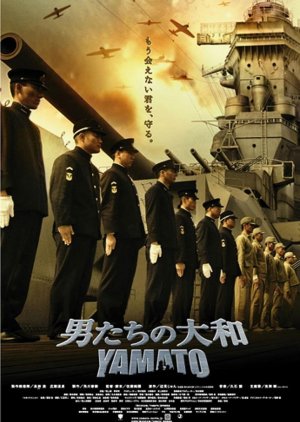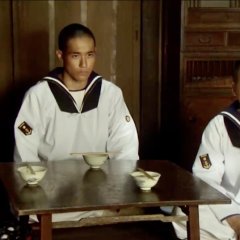Japan's newfound love for nationalistic military thrillers continues on apace with this moving true story of the crew of doomed warship, the Yamato. On April 6, 1945, the largest battleship ever constructed, and its crew of nearly 3000 men, was dispatched on a suicide mission to stop allied forces from taking Okinawa. Never reaching her final destination, the Yamato was besieged by close to 400 U.S. aircraft. After sustaining 8 bomb and 10 torpedo hits, this huge warship capsized and sank some 200km from Okinawa. She remains there to this day. Directed by veteran filmmaker Sato Junya (The Bullet Train, Golgo 13), Otokotachi no Yamato tells the story of all involved in that fateful mission - those who survived, those who waited patiently at home for word from their loved ones, and the thousands of men who died aboard the mighty vessel. Featuring a fine ensemble cast, led by Shido Nakamura, star of Neighbor No.13 and Fearless, and a majestic score from renowned composer Joe Hisaishi (Spirited Away), the film is a thrilling retelling of one of the pivotal moments of Japan's WWII campaign. Edit Translation
- English
- magyar / magyar nyelv
- dansk
- Norsk
- Native Title: 男たちの大和
- Also Known As: Otoko-tachi no Yamato, The Men's Yamato
- Screenwriter & Director: Sato Junya
- Genres: Action, Historical, Drama, War
Cast & Credits
- Nakadai Tatsuya Main Role
- Sorimachi TakashiMoriwaki ShohachiMain Role
- Takahata AtsukoTsune TamakiSupport Role
- Aoi YuTaeko NozakiSupport Role
- Watari TetsuyaSeiichi ItoSupport Role
Reviews

Tonally messy but otherwise great
While the main body of its story is at tonal odds with its framing device, Junya Satō's Yamato is an impressively made, often brutal exploration into the lives of those aboard Japan's most iconic warship during her final days at sea. Yamato oddly decides to use the Titanic and Saving Private Ryan storytelling formula, which is where this tonal contradiction stems from, it's at heart an anti-war film but the framing device dangerously treads the line of propaganda mode (the song at the end almost tipped it over the edge). However, Yamato manages to sail on unopposed, opening up discussion and criticism of such reckless leadership that led to such an abhorrent waste of life, a suicidal last defence. Satō's clean direction helps to highlight the outstanding production design, most of the budget having been spent on painstakingly recreating part of the titular ship on a 1:1 scale, the two complement each other exceptionally well. Joe Hisaishi's music isn't as memorable as some of his other efforts, it often feels like he's emulating a Hans Zimmer score, but it's an effective soundtrack nonetheless. Backed by great performances and a stunningly realised final battle, Yamato strategically uses the ruptures of trauma in an attempt to erase any inconsistencies, all the while reassuring its shocked audiences with a familiar, if conventional, film style.

















































